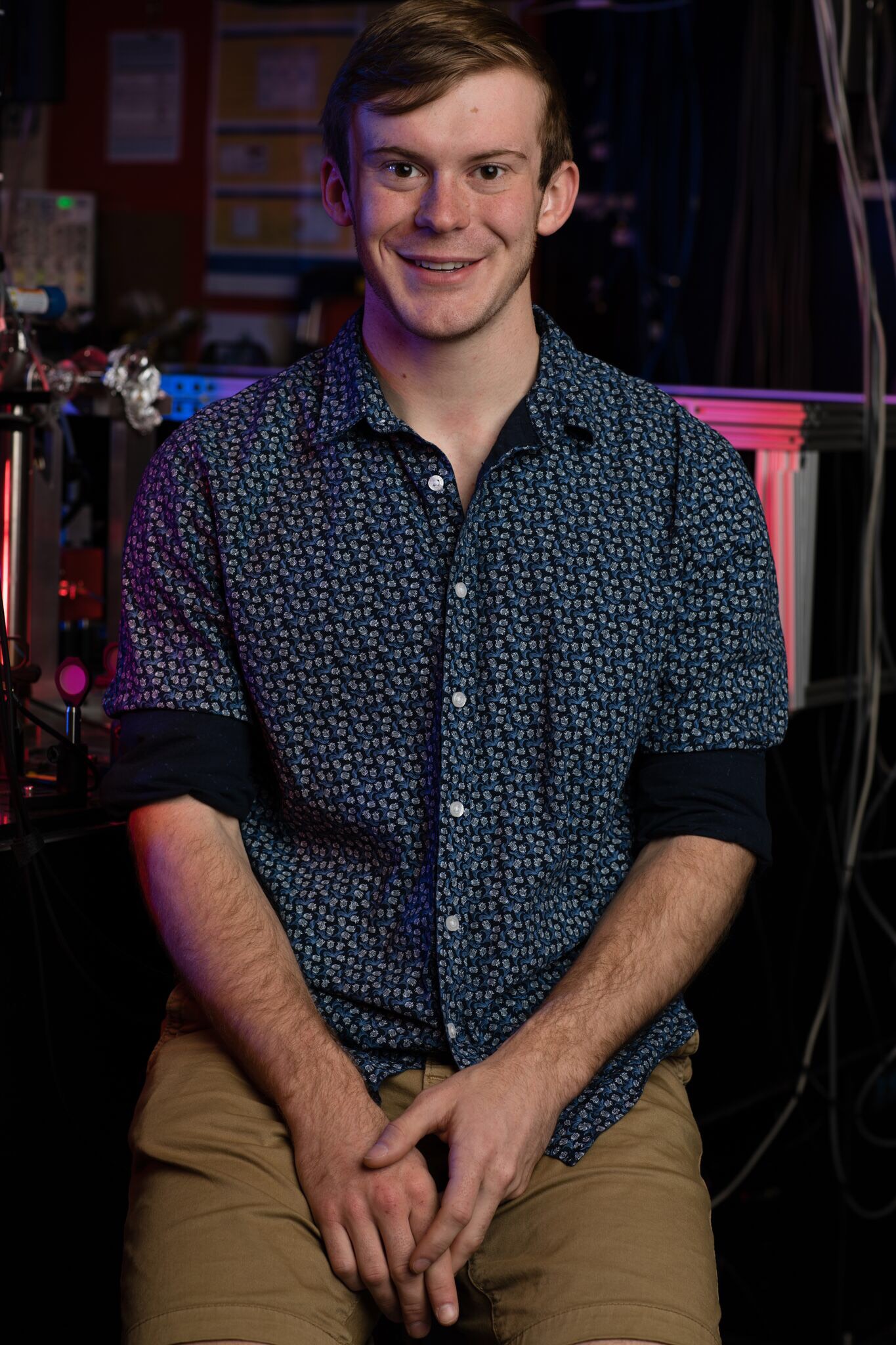

Alex Frenett is a math and physics double major who is writing a thesis on the photoionization of oxygen. His advisor is Assistant Professor of Physics and Astronomy David Hanneke.
Q: What’s your research process been like?
A: Over the summer, I was reading and understanding the theory behind photoionization, especially angular momentum and energy. There are normal rules for how molecules are excited or de-excited. Like, you’ve heard of energy levels. There are normal rules for how those can change with photons. But when you’re actually taking off the electron, it’s much more difficult. A lot of the summer was reading and understanding the theory, coming up with … a prediction of what frequency we want the laser at to get the least states of ions. So, to get only two or three kinds of ions rather than like 15. So that was a lot of the summer, … kind of reading up on that, and then end of the summer until now, I’ve kind of changed focus to the more experimental stuff. Because I am building this piece of apparatus … I’ve been looking at how I want to set this up — how to set up something that’ll do what you want it to do, not make it too overly expensive, understand really the physics behind this machine that you’re building. Because, like I’ve said, this is not a new process, but my professor has never built one of these. The post-doc that I’m working with has worked with one of them, but they were doing that for their main experiment. This is like a side project, and so there are a lot of changes, and so I’m kind of understanding how to set up an experimental setup right now. Hopefully soon, I’ll transition into having my professor buy the parts and actually start setting it up.
Q: What’s been the most difficult part of writing this thesis so far?
A: I think because of the nature of my project, which is something that a lot of people have done, especially building this setup, a lot of people have done it, so much so that there’s not a lot of literature on it. Because everyone kind of just assumes that you learn how to do it in a class in graduate school, or your professor will tell you how to do it. Trying to actually look back and find why these things work … for example, we want to pulse the gas into the system to make a beam. Just that by itself turns out [to be] pretty complicated … This is going to be in a vacuum chamber, so how fast we’re pumping out [and] all of these things are not like the physics that we think of in school, like equations … But the experimental stuff, literally taking into account real world, … like, this is a piece of metal that you’re opening and closing really fast … It’s not like a computer where you just assume, “Oh, now you have gas in there.” So I think understanding the experimental aspects, the stuff that’s not taught in school, has been the hardest part — especially because my product is an old technique and so it’s not really written about a lot.
Q: Do you think your thesis will fill in the gaps?
A: Hopefully! … One of the most useful resources has been previous theses, not just here, but Ph.D. theses, because in a thesis you write down your whole process. And in a lot of scientific papers, you just kind of write your results. Hopefully, that’ll help whoever works next, and you know, maybe I can find something that helps my professor understand it better, because he hasn’t worked with one of these, as far as I know. So I think getting the knowledge base and kind of writing it down will help people in the future, too.
Q: What has been the most rewarding part of writing a thesis so far?
A: I took a little hiatus from the theory and [from] my own project to help with the major lab project, also in the summer. We were aligning this really powerful laser … called a dye laser, basically because you shine a different color laser into, literally, dye. It’s pink and it runs through and it changes it to an orange light, which my professor and the postdoc set up pretty easily. But then the orange light goes through what we call a doubler, and so it doubles the frequency and turns it into UV light. And … the postdoc and I worked on that — it took us one afternoon to set that up, which is about normal, but it could have taken a lot longer, and so it felt good to get that set and working in a pretty short amount of time. It kind of showed that previous work in the lab paid off and that I kind of knew what I was doing.